Evaluating Unethicality among Top Banks in Australia - Finance
VerifiedAdded on 2023/06/05
|8
|2369
|415
Essay
AI Summary
This essay critically evaluates the presence of unethical practices within the top banks in Australia, drawing upon Isabelle Lane's article and recent scandals involving institutions like CBA. It identifies key ethical issues such as charging fees to deceased clients, money laundering, and breaches of corporate social responsibility. The essay argues that current measures like fines and refunds are insufficient deterrents. It proposes a more stringent approach, including banning the most notorious institutions to restore transparency, accountability, and public trust in the financial sector, alongside continuous assessment of employees' moral standing. The essay concludes by emphasizing that unethical practices stem from broader societal issues and the need for improved moral education.
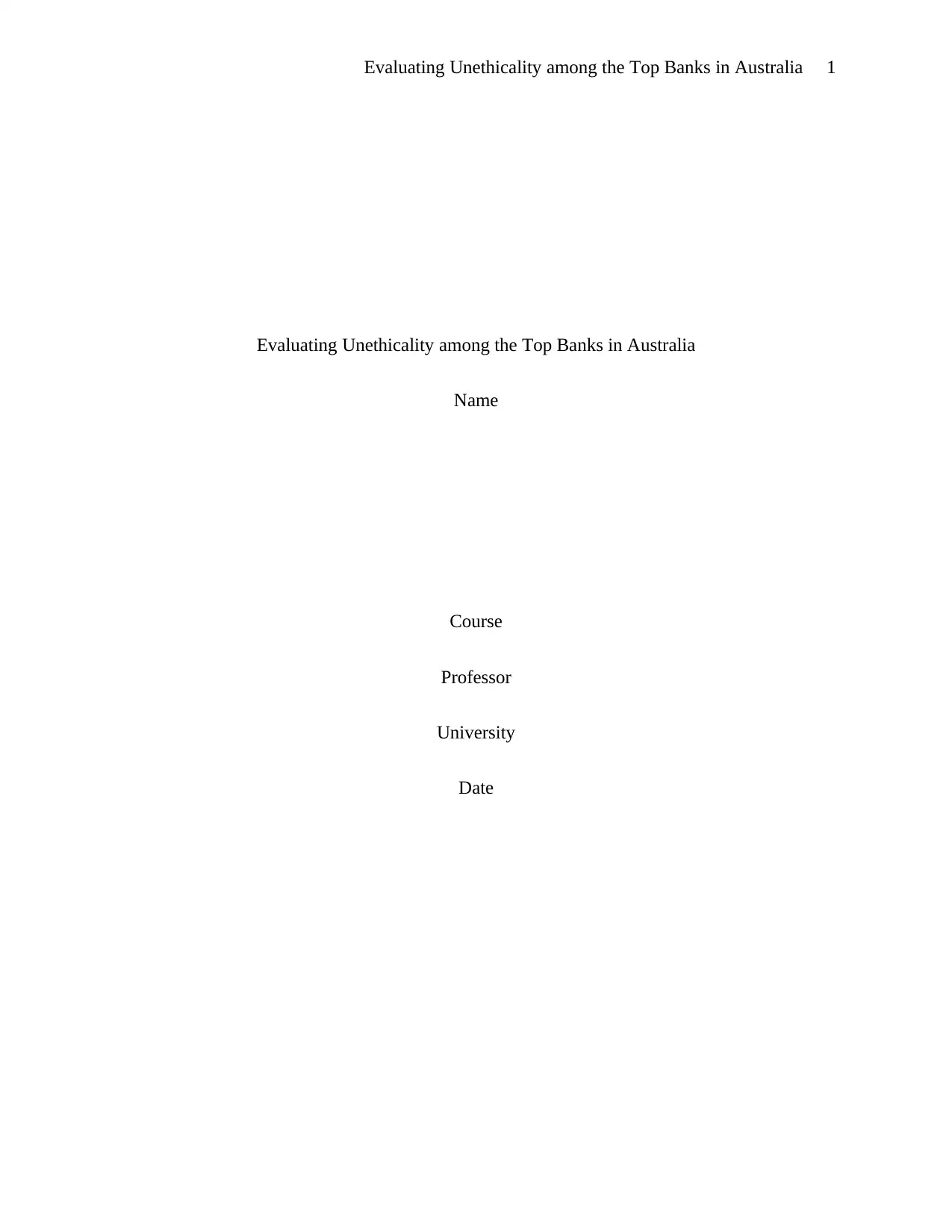
Evaluating Unethicality among the Top Banks in Australia 1
Evaluating Unethicality among the Top Banks in Australia
Name
Course
Professor
University
Date
Evaluating Unethicality among the Top Banks in Australia
Name
Course
Professor
University
Date
Paraphrase This Document
Need a fresh take? Get an instant paraphrase of this document with our AI Paraphraser
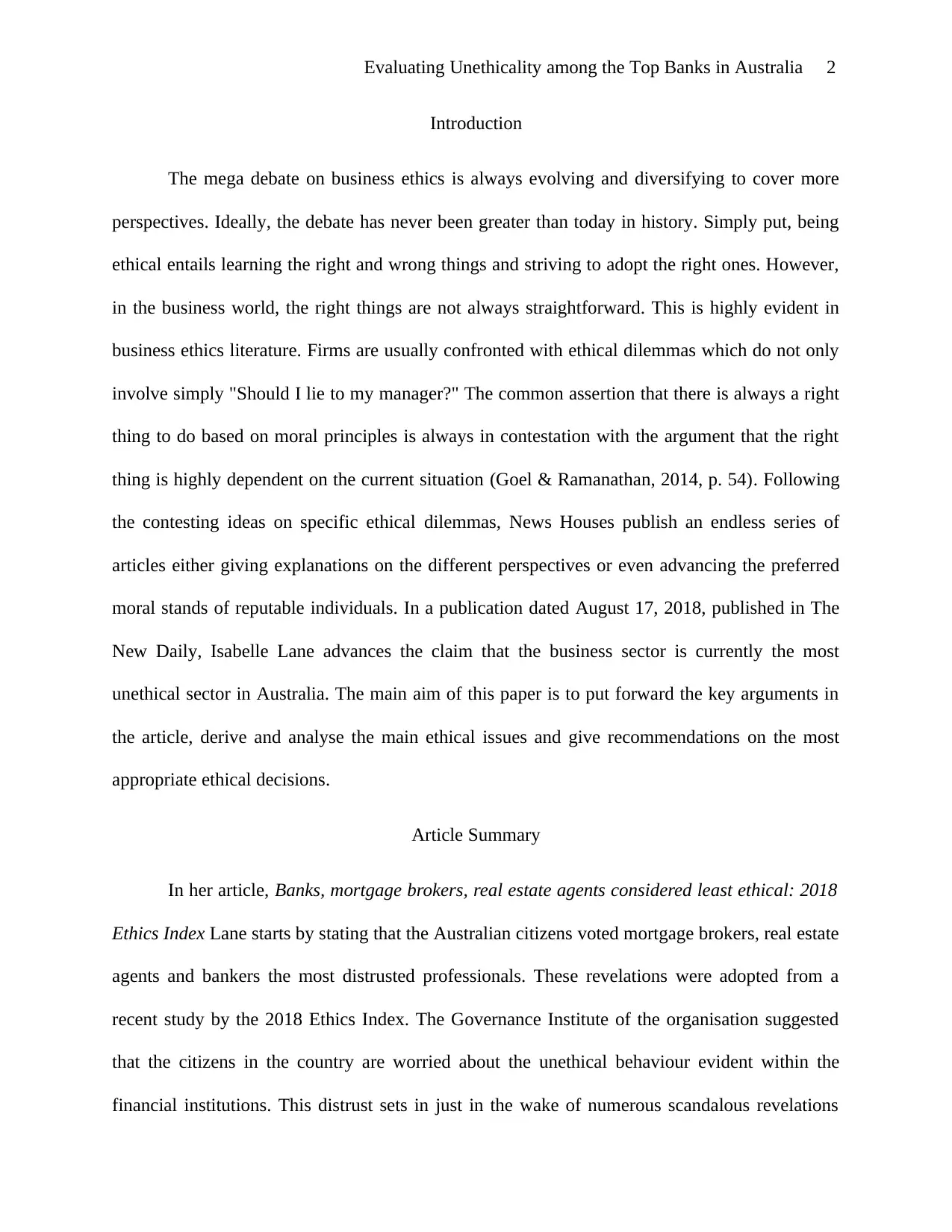
Evaluating Unethicality among the Top Banks in Australia 2
Introduction
The mega debate on business ethics is always evolving and diversifying to cover more
perspectives. Ideally, the debate has never been greater than today in history. Simply put, being
ethical entails learning the right and wrong things and striving to adopt the right ones. However,
in the business world, the right things are not always straightforward. This is highly evident in
business ethics literature. Firms are usually confronted with ethical dilemmas which do not only
involve simply "Should I lie to my manager?" The common assertion that there is always a right
thing to do based on moral principles is always in contestation with the argument that the right
thing is highly dependent on the current situation (Goel & Ramanathan, 2014, p. 54). Following
the contesting ideas on specific ethical dilemmas, News Houses publish an endless series of
articles either giving explanations on the different perspectives or even advancing the preferred
moral stands of reputable individuals. In a publication dated August 17, 2018, published in The
New Daily, Isabelle Lane advances the claim that the business sector is currently the most
unethical sector in Australia. The main aim of this paper is to put forward the key arguments in
the article, derive and analyse the main ethical issues and give recommendations on the most
appropriate ethical decisions.
Article Summary
In her article, Banks, mortgage brokers, real estate agents considered least ethical: 2018
Ethics Index Lane starts by stating that the Australian citizens voted mortgage brokers, real estate
agents and bankers the most distrusted professionals. These revelations were adopted from a
recent study by the 2018 Ethics Index. The Governance Institute of the organisation suggested
that the citizens in the country are worried about the unethical behaviour evident within the
financial institutions. This distrust sets in just in the wake of numerous scandalous revelations
Introduction
The mega debate on business ethics is always evolving and diversifying to cover more
perspectives. Ideally, the debate has never been greater than today in history. Simply put, being
ethical entails learning the right and wrong things and striving to adopt the right ones. However,
in the business world, the right things are not always straightforward. This is highly evident in
business ethics literature. Firms are usually confronted with ethical dilemmas which do not only
involve simply "Should I lie to my manager?" The common assertion that there is always a right
thing to do based on moral principles is always in contestation with the argument that the right
thing is highly dependent on the current situation (Goel & Ramanathan, 2014, p. 54). Following
the contesting ideas on specific ethical dilemmas, News Houses publish an endless series of
articles either giving explanations on the different perspectives or even advancing the preferred
moral stands of reputable individuals. In a publication dated August 17, 2018, published in The
New Daily, Isabelle Lane advances the claim that the business sector is currently the most
unethical sector in Australia. The main aim of this paper is to put forward the key arguments in
the article, derive and analyse the main ethical issues and give recommendations on the most
appropriate ethical decisions.
Article Summary
In her article, Banks, mortgage brokers, real estate agents considered least ethical: 2018
Ethics Index Lane starts by stating that the Australian citizens voted mortgage brokers, real estate
agents and bankers the most distrusted professionals. These revelations were adopted from a
recent study by the 2018 Ethics Index. The Governance Institute of the organisation suggested
that the citizens in the country are worried about the unethical behaviour evident within the
financial institutions. This distrust sets in just in the wake of numerous scandalous revelations
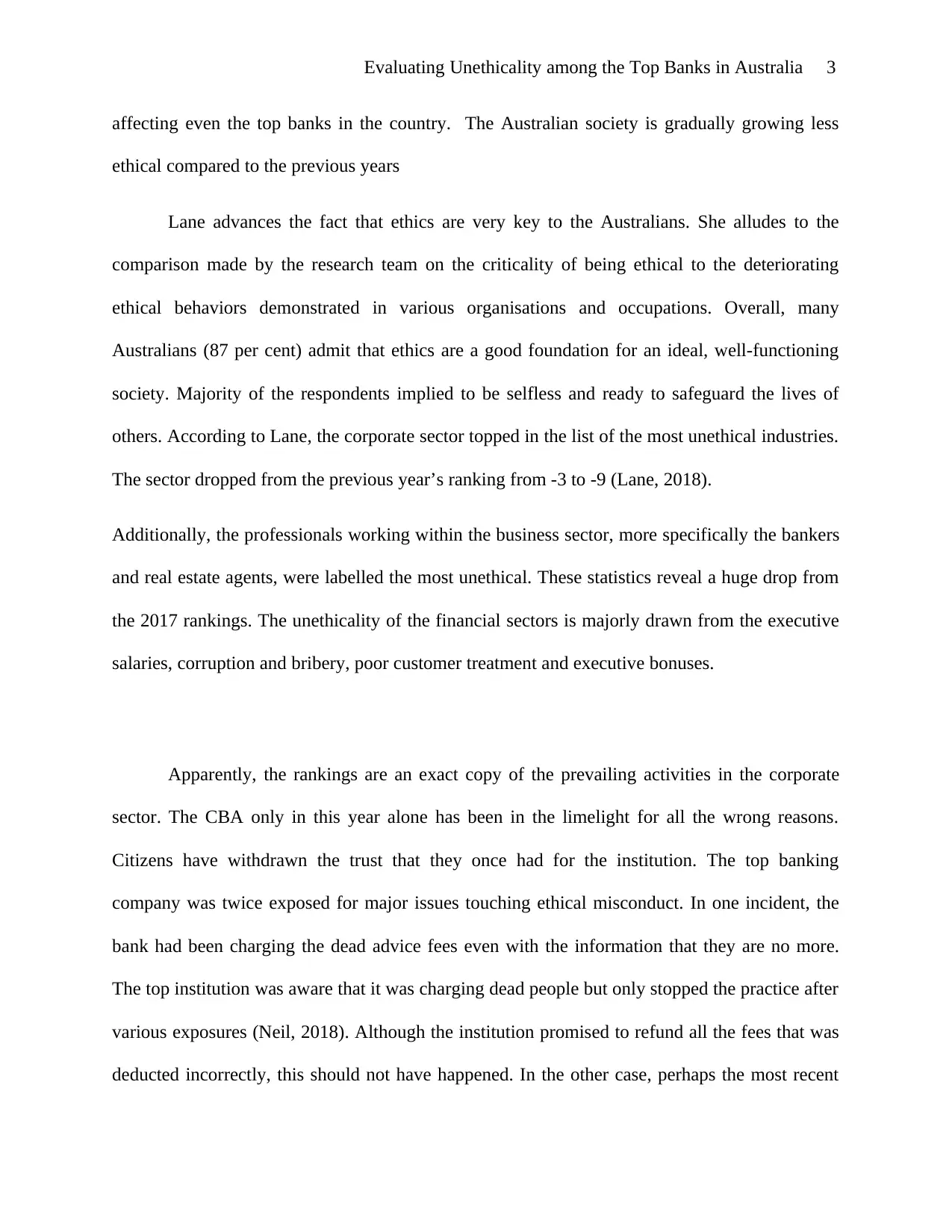
Evaluating Unethicality among the Top Banks in Australia 3
affecting even the top banks in the country. The Australian society is gradually growing less
ethical compared to the previous years
Lane advances the fact that ethics are very key to the Australians. She alludes to the
comparison made by the research team on the criticality of being ethical to the deteriorating
ethical behaviors demonstrated in various organisations and occupations. Overall, many
Australians (87 per cent) admit that ethics are a good foundation for an ideal, well-functioning
society. Majority of the respondents implied to be selfless and ready to safeguard the lives of
others. According to Lane, the corporate sector topped in the list of the most unethical industries.
The sector dropped from the previous year’s ranking from -3 to -9 (Lane, 2018).
Additionally, the professionals working within the business sector, more specifically the bankers
and real estate agents, were labelled the most unethical. These statistics reveal a huge drop from
the 2017 rankings. The unethicality of the financial sectors is majorly drawn from the executive
salaries, corruption and bribery, poor customer treatment and executive bonuses.
Apparently, the rankings are an exact copy of the prevailing activities in the corporate
sector. The CBA only in this year alone has been in the limelight for all the wrong reasons.
Citizens have withdrawn the trust that they once had for the institution. The top banking
company was twice exposed for major issues touching ethical misconduct. In one incident, the
bank had been charging the dead advice fees even with the information that they are no more.
The top institution was aware that it was charging dead people but only stopped the practice after
various exposures (Neil, 2018). Although the institution promised to refund all the fees that was
deducted incorrectly, this should not have happened. In the other case, perhaps the most recent
affecting even the top banks in the country. The Australian society is gradually growing less
ethical compared to the previous years
Lane advances the fact that ethics are very key to the Australians. She alludes to the
comparison made by the research team on the criticality of being ethical to the deteriorating
ethical behaviors demonstrated in various organisations and occupations. Overall, many
Australians (87 per cent) admit that ethics are a good foundation for an ideal, well-functioning
society. Majority of the respondents implied to be selfless and ready to safeguard the lives of
others. According to Lane, the corporate sector topped in the list of the most unethical industries.
The sector dropped from the previous year’s ranking from -3 to -9 (Lane, 2018).
Additionally, the professionals working within the business sector, more specifically the bankers
and real estate agents, were labelled the most unethical. These statistics reveal a huge drop from
the 2017 rankings. The unethicality of the financial sectors is majorly drawn from the executive
salaries, corruption and bribery, poor customer treatment and executive bonuses.
Apparently, the rankings are an exact copy of the prevailing activities in the corporate
sector. The CBA only in this year alone has been in the limelight for all the wrong reasons.
Citizens have withdrawn the trust that they once had for the institution. The top banking
company was twice exposed for major issues touching ethical misconduct. In one incident, the
bank had been charging the dead advice fees even with the information that they are no more.
The top institution was aware that it was charging dead people but only stopped the practice after
various exposures (Neil, 2018). Although the institution promised to refund all the fees that was
deducted incorrectly, this should not have happened. In the other case, perhaps the most recent
⊘ This is a preview!⊘
Do you want full access?
Subscribe today to unlock all pages.

Trusted by 1+ million students worldwide
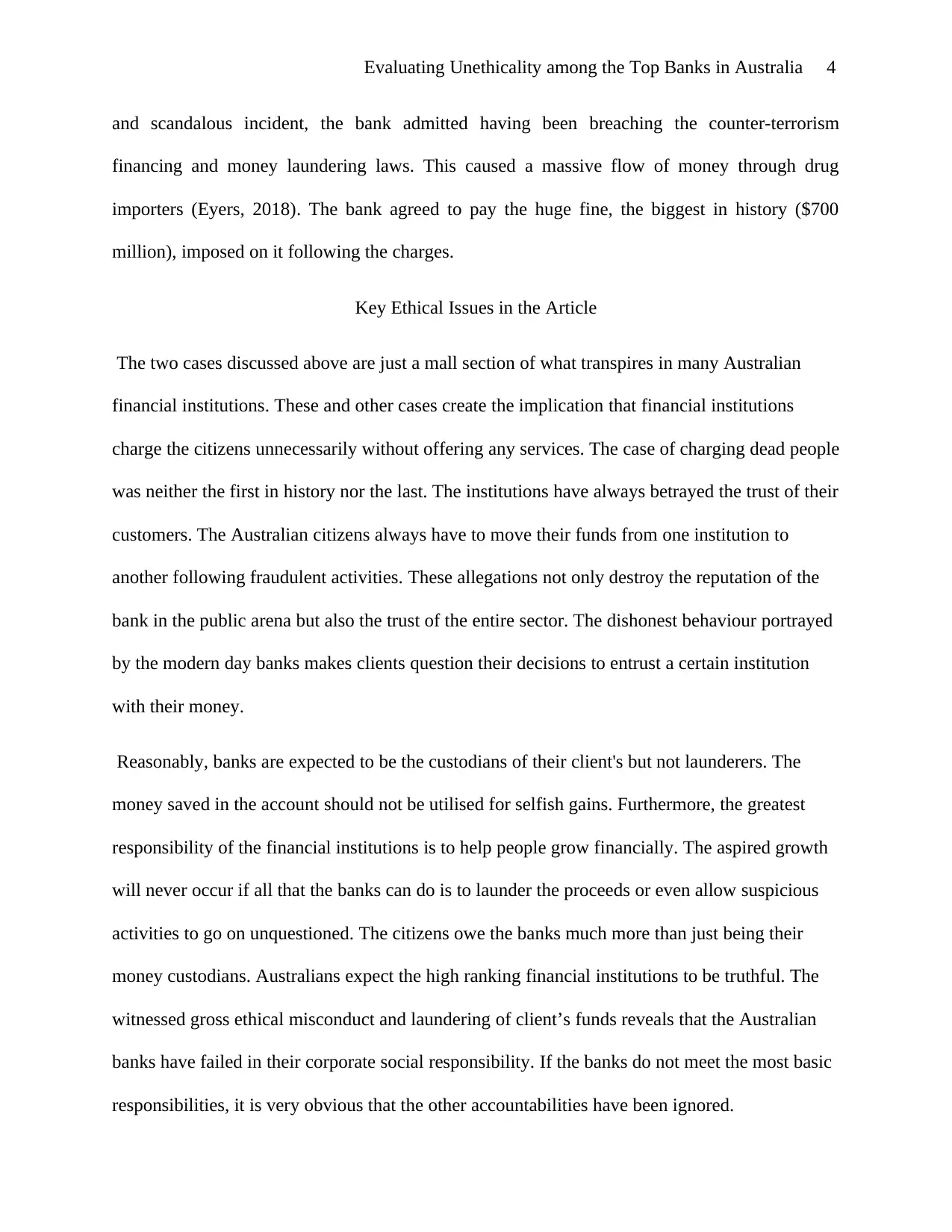
Evaluating Unethicality among the Top Banks in Australia 4
and scandalous incident, the bank admitted having been breaching the counter-terrorism
financing and money laundering laws. This caused a massive flow of money through drug
importers (Eyers, 2018). The bank agreed to pay the huge fine, the biggest in history ($700
million), imposed on it following the charges.
Key Ethical Issues in the Article
The two cases discussed above are just a mall section of what transpires in many Australian
financial institutions. These and other cases create the implication that financial institutions
charge the citizens unnecessarily without offering any services. The case of charging dead people
was neither the first in history nor the last. The institutions have always betrayed the trust of their
customers. The Australian citizens always have to move their funds from one institution to
another following fraudulent activities. These allegations not only destroy the reputation of the
bank in the public arena but also the trust of the entire sector. The dishonest behaviour portrayed
by the modern day banks makes clients question their decisions to entrust a certain institution
with their money.
Reasonably, banks are expected to be the custodians of their client's but not launderers. The
money saved in the account should not be utilised for selfish gains. Furthermore, the greatest
responsibility of the financial institutions is to help people grow financially. The aspired growth
will never occur if all that the banks can do is to launder the proceeds or even allow suspicious
activities to go on unquestioned. The citizens owe the banks much more than just being their
money custodians. Australians expect the high ranking financial institutions to be truthful. The
witnessed gross ethical misconduct and laundering of client’s funds reveals that the Australian
banks have failed in their corporate social responsibility. If the banks do not meet the most basic
responsibilities, it is very obvious that the other accountabilities have been ignored.
and scandalous incident, the bank admitted having been breaching the counter-terrorism
financing and money laundering laws. This caused a massive flow of money through drug
importers (Eyers, 2018). The bank agreed to pay the huge fine, the biggest in history ($700
million), imposed on it following the charges.
Key Ethical Issues in the Article
The two cases discussed above are just a mall section of what transpires in many Australian
financial institutions. These and other cases create the implication that financial institutions
charge the citizens unnecessarily without offering any services. The case of charging dead people
was neither the first in history nor the last. The institutions have always betrayed the trust of their
customers. The Australian citizens always have to move their funds from one institution to
another following fraudulent activities. These allegations not only destroy the reputation of the
bank in the public arena but also the trust of the entire sector. The dishonest behaviour portrayed
by the modern day banks makes clients question their decisions to entrust a certain institution
with their money.
Reasonably, banks are expected to be the custodians of their client's but not launderers. The
money saved in the account should not be utilised for selfish gains. Furthermore, the greatest
responsibility of the financial institutions is to help people grow financially. The aspired growth
will never occur if all that the banks can do is to launder the proceeds or even allow suspicious
activities to go on unquestioned. The citizens owe the banks much more than just being their
money custodians. Australians expect the high ranking financial institutions to be truthful. The
witnessed gross ethical misconduct and laundering of client’s funds reveals that the Australian
banks have failed in their corporate social responsibility. If the banks do not meet the most basic
responsibilities, it is very obvious that the other accountabilities have been ignored.
Paraphrase This Document
Need a fresh take? Get an instant paraphrase of this document with our AI Paraphraser
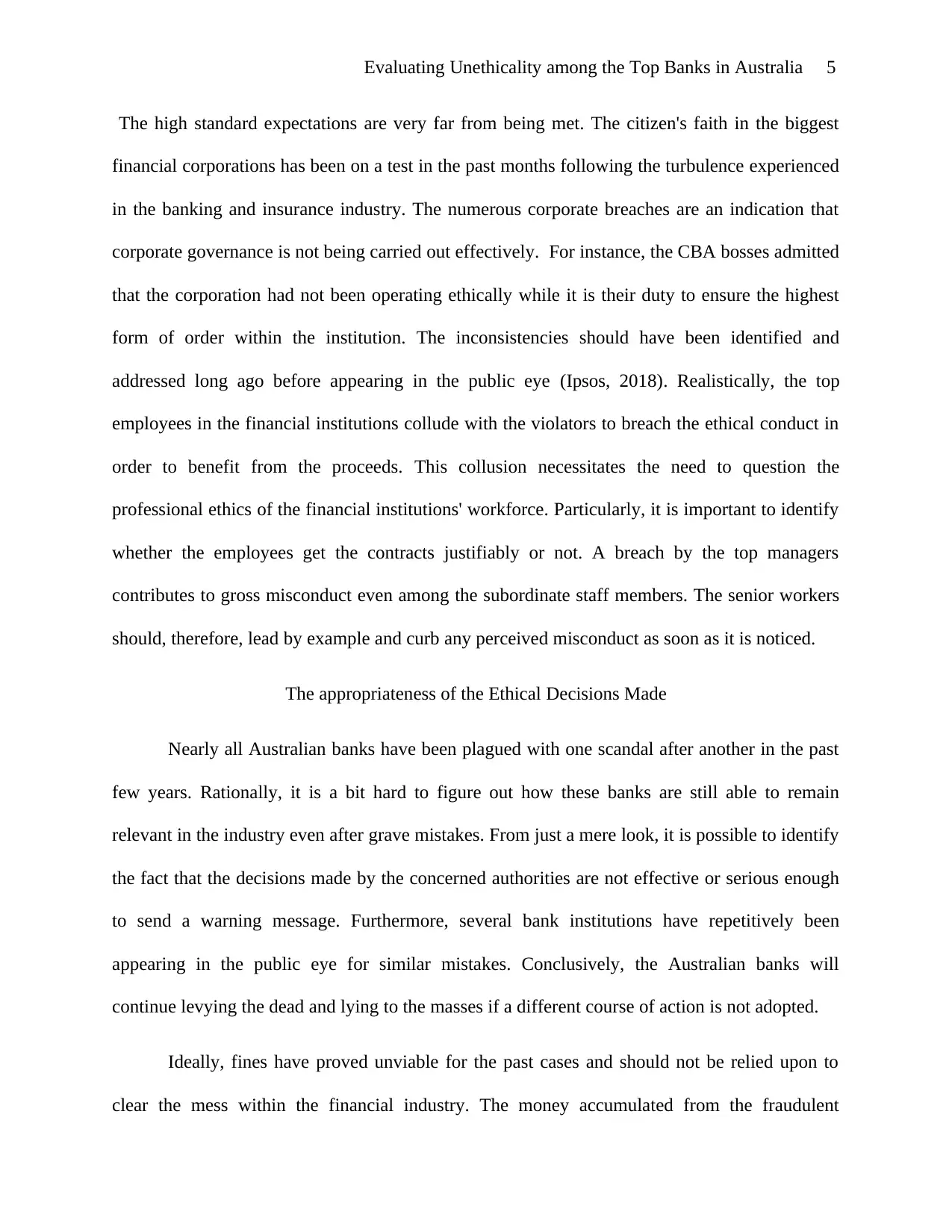
Evaluating Unethicality among the Top Banks in Australia 5
The high standard expectations are very far from being met. The citizen's faith in the biggest
financial corporations has been on a test in the past months following the turbulence experienced
in the banking and insurance industry. The numerous corporate breaches are an indication that
corporate governance is not being carried out effectively. For instance, the CBA bosses admitted
that the corporation had not been operating ethically while it is their duty to ensure the highest
form of order within the institution. The inconsistencies should have been identified and
addressed long ago before appearing in the public eye (Ipsos, 2018). Realistically, the top
employees in the financial institutions collude with the violators to breach the ethical conduct in
order to benefit from the proceeds. This collusion necessitates the need to question the
professional ethics of the financial institutions' workforce. Particularly, it is important to identify
whether the employees get the contracts justifiably or not. A breach by the top managers
contributes to gross misconduct even among the subordinate staff members. The senior workers
should, therefore, lead by example and curb any perceived misconduct as soon as it is noticed.
The appropriateness of the Ethical Decisions Made
Nearly all Australian banks have been plagued with one scandal after another in the past
few years. Rationally, it is a bit hard to figure out how these banks are still able to remain
relevant in the industry even after grave mistakes. From just a mere look, it is possible to identify
the fact that the decisions made by the concerned authorities are not effective or serious enough
to send a warning message. Furthermore, several bank institutions have repetitively been
appearing in the public eye for similar mistakes. Conclusively, the Australian banks will
continue levying the dead and lying to the masses if a different course of action is not adopted.
Ideally, fines have proved unviable for the past cases and should not be relied upon to
clear the mess within the financial industry. The money accumulated from the fraudulent
The high standard expectations are very far from being met. The citizen's faith in the biggest
financial corporations has been on a test in the past months following the turbulence experienced
in the banking and insurance industry. The numerous corporate breaches are an indication that
corporate governance is not being carried out effectively. For instance, the CBA bosses admitted
that the corporation had not been operating ethically while it is their duty to ensure the highest
form of order within the institution. The inconsistencies should have been identified and
addressed long ago before appearing in the public eye (Ipsos, 2018). Realistically, the top
employees in the financial institutions collude with the violators to breach the ethical conduct in
order to benefit from the proceeds. This collusion necessitates the need to question the
professional ethics of the financial institutions' workforce. Particularly, it is important to identify
whether the employees get the contracts justifiably or not. A breach by the top managers
contributes to gross misconduct even among the subordinate staff members. The senior workers
should, therefore, lead by example and curb any perceived misconduct as soon as it is noticed.
The appropriateness of the Ethical Decisions Made
Nearly all Australian banks have been plagued with one scandal after another in the past
few years. Rationally, it is a bit hard to figure out how these banks are still able to remain
relevant in the industry even after grave mistakes. From just a mere look, it is possible to identify
the fact that the decisions made by the concerned authorities are not effective or serious enough
to send a warning message. Furthermore, several bank institutions have repetitively been
appearing in the public eye for similar mistakes. Conclusively, the Australian banks will
continue levying the dead and lying to the masses if a different course of action is not adopted.
Ideally, fines have proved unviable for the past cases and should not be relied upon to
clear the mess within the financial industry. The money accumulated from the fraudulent
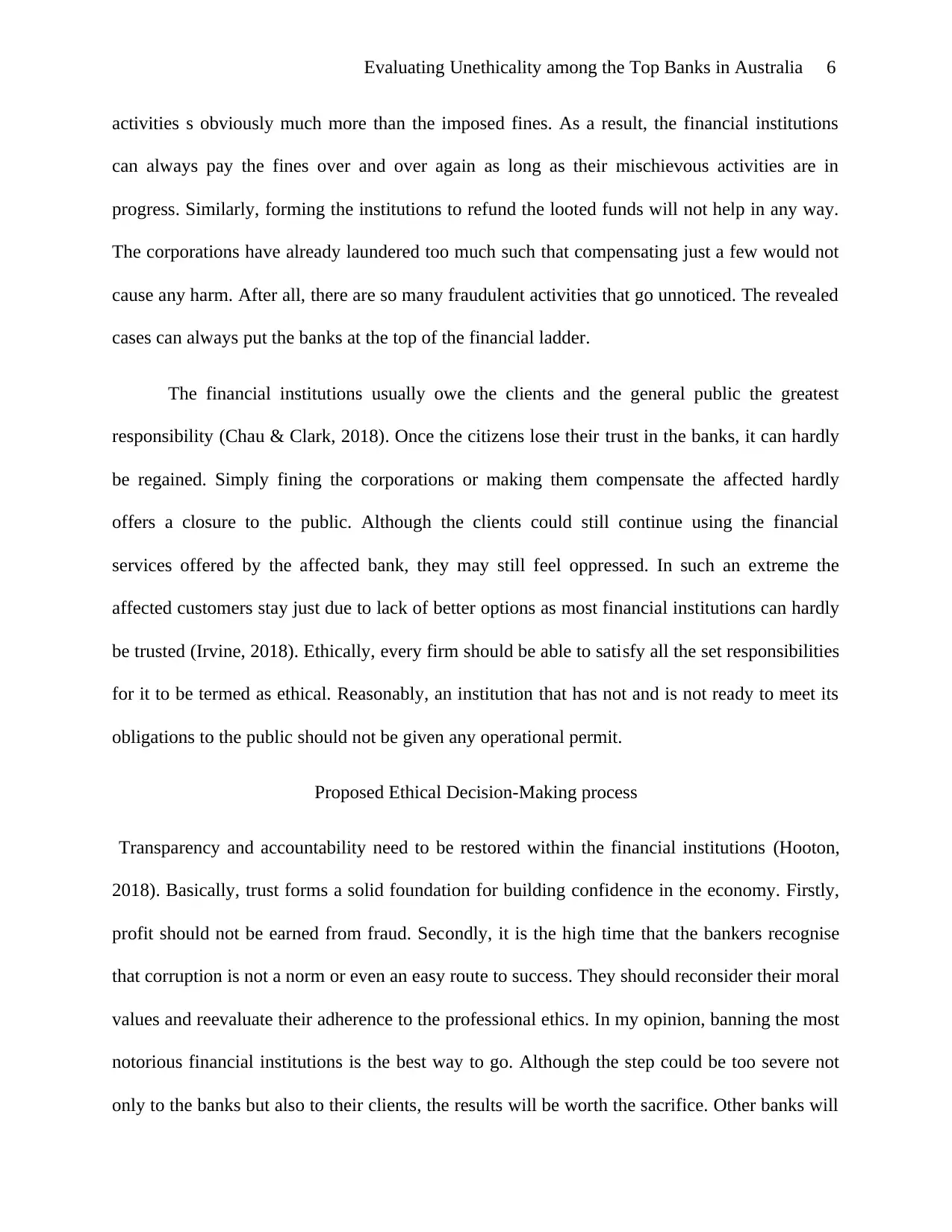
Evaluating Unethicality among the Top Banks in Australia 6
activities s obviously much more than the imposed fines. As a result, the financial institutions
can always pay the fines over and over again as long as their mischievous activities are in
progress. Similarly, forming the institutions to refund the looted funds will not help in any way.
The corporations have already laundered too much such that compensating just a few would not
cause any harm. After all, there are so many fraudulent activities that go unnoticed. The revealed
cases can always put the banks at the top of the financial ladder.
The financial institutions usually owe the clients and the general public the greatest
responsibility (Chau & Clark, 2018). Once the citizens lose their trust in the banks, it can hardly
be regained. Simply fining the corporations or making them compensate the affected hardly
offers a closure to the public. Although the clients could still continue using the financial
services offered by the affected bank, they may still feel oppressed. In such an extreme the
affected customers stay just due to lack of better options as most financial institutions can hardly
be trusted (Irvine, 2018). Ethically, every firm should be able to satisfy all the set responsibilities
for it to be termed as ethical. Reasonably, an institution that has not and is not ready to meet its
obligations to the public should not be given any operational permit.
Proposed Ethical Decision-Making process
Transparency and accountability need to be restored within the financial institutions (Hooton,
2018). Basically, trust forms a solid foundation for building confidence in the economy. Firstly,
profit should not be earned from fraud. Secondly, it is the high time that the bankers recognise
that corruption is not a norm or even an easy route to success. They should reconsider their moral
values and reevaluate their adherence to the professional ethics. In my opinion, banning the most
notorious financial institutions is the best way to go. Although the step could be too severe not
only to the banks but also to their clients, the results will be worth the sacrifice. Other banks will
activities s obviously much more than the imposed fines. As a result, the financial institutions
can always pay the fines over and over again as long as their mischievous activities are in
progress. Similarly, forming the institutions to refund the looted funds will not help in any way.
The corporations have already laundered too much such that compensating just a few would not
cause any harm. After all, there are so many fraudulent activities that go unnoticed. The revealed
cases can always put the banks at the top of the financial ladder.
The financial institutions usually owe the clients and the general public the greatest
responsibility (Chau & Clark, 2018). Once the citizens lose their trust in the banks, it can hardly
be regained. Simply fining the corporations or making them compensate the affected hardly
offers a closure to the public. Although the clients could still continue using the financial
services offered by the affected bank, they may still feel oppressed. In such an extreme the
affected customers stay just due to lack of better options as most financial institutions can hardly
be trusted (Irvine, 2018). Ethically, every firm should be able to satisfy all the set responsibilities
for it to be termed as ethical. Reasonably, an institution that has not and is not ready to meet its
obligations to the public should not be given any operational permit.
Proposed Ethical Decision-Making process
Transparency and accountability need to be restored within the financial institutions (Hooton,
2018). Basically, trust forms a solid foundation for building confidence in the economy. Firstly,
profit should not be earned from fraud. Secondly, it is the high time that the bankers recognise
that corruption is not a norm or even an easy route to success. They should reconsider their moral
values and reevaluate their adherence to the professional ethics. In my opinion, banning the most
notorious financial institutions is the best way to go. Although the step could be too severe not
only to the banks but also to their clients, the results will be worth the sacrifice. Other banks will
⊘ This is a preview!⊘
Do you want full access?
Subscribe today to unlock all pages.

Trusted by 1+ million students worldwide
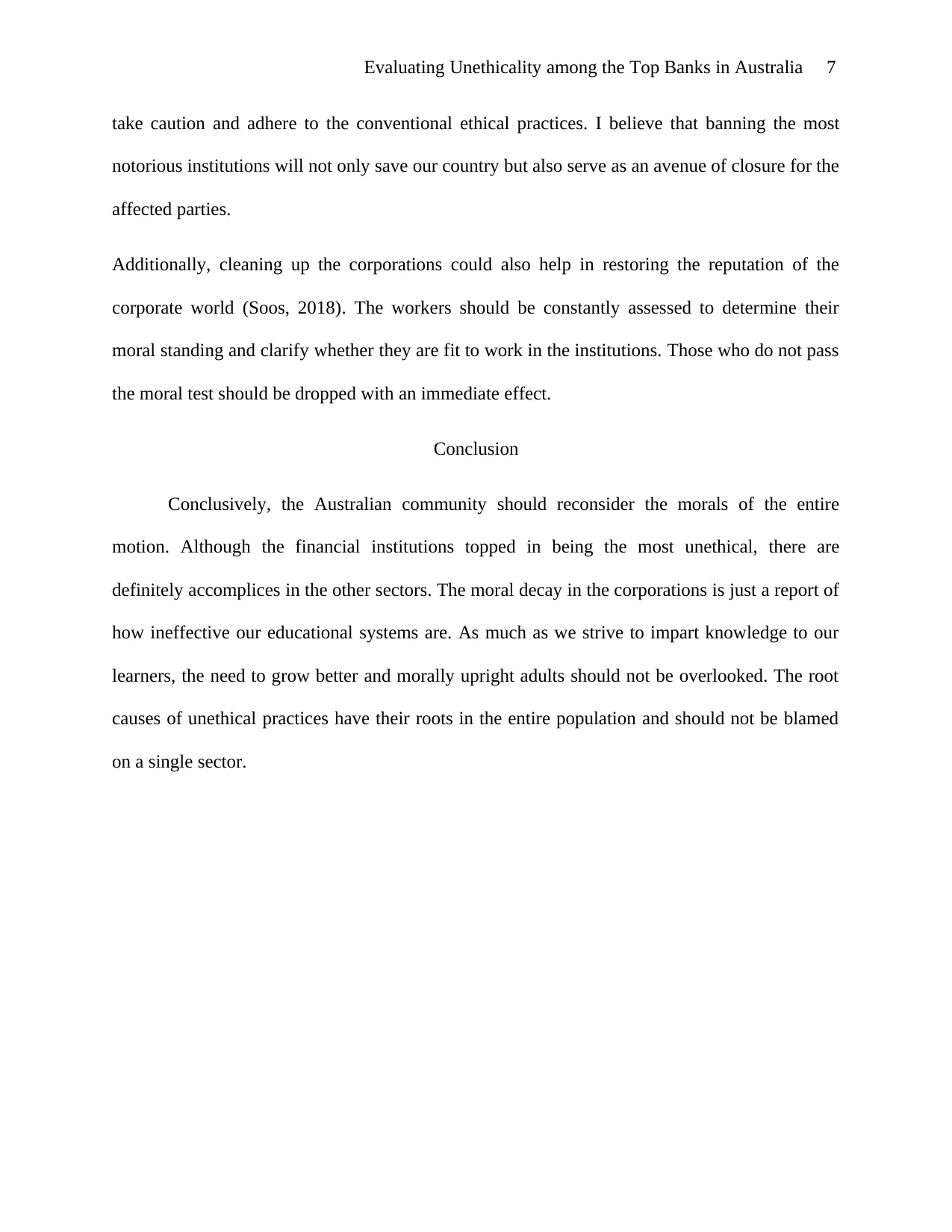
Evaluating Unethicality among the Top Banks in Australia 7
take caution and adhere to the conventional ethical practices. I believe that banning the most
notorious institutions will not only save our country but also serve as an avenue of closure for the
affected parties.
Additionally, cleaning up the corporations could also help in restoring the reputation of the
corporate world (Soos, 2018). The workers should be constantly assessed to determine their
moral standing and clarify whether they are fit to work in the institutions. Those who do not pass
the moral test should be dropped with an immediate effect.
Conclusion
Conclusively, the Australian community should reconsider the morals of the entire
motion. Although the financial institutions topped in being the most unethical, there are
definitely accomplices in the other sectors. The moral decay in the corporations is just a report of
how ineffective our educational systems are. As much as we strive to impart knowledge to our
learners, the need to grow better and morally upright adults should not be overlooked. The root
causes of unethical practices have their roots in the entire population and should not be blamed
on a single sector.
take caution and adhere to the conventional ethical practices. I believe that banning the most
notorious institutions will not only save our country but also serve as an avenue of closure for the
affected parties.
Additionally, cleaning up the corporations could also help in restoring the reputation of the
corporate world (Soos, 2018). The workers should be constantly assessed to determine their
moral standing and clarify whether they are fit to work in the institutions. Those who do not pass
the moral test should be dropped with an immediate effect.
Conclusion
Conclusively, the Australian community should reconsider the morals of the entire
motion. Although the financial institutions topped in being the most unethical, there are
definitely accomplices in the other sectors. The moral decay in the corporations is just a report of
how ineffective our educational systems are. As much as we strive to impart knowledge to our
learners, the need to grow better and morally upright adults should not be overlooked. The root
causes of unethical practices have their roots in the entire population and should not be blamed
on a single sector.
Paraphrase This Document
Need a fresh take? Get an instant paraphrase of this document with our AI Paraphraser
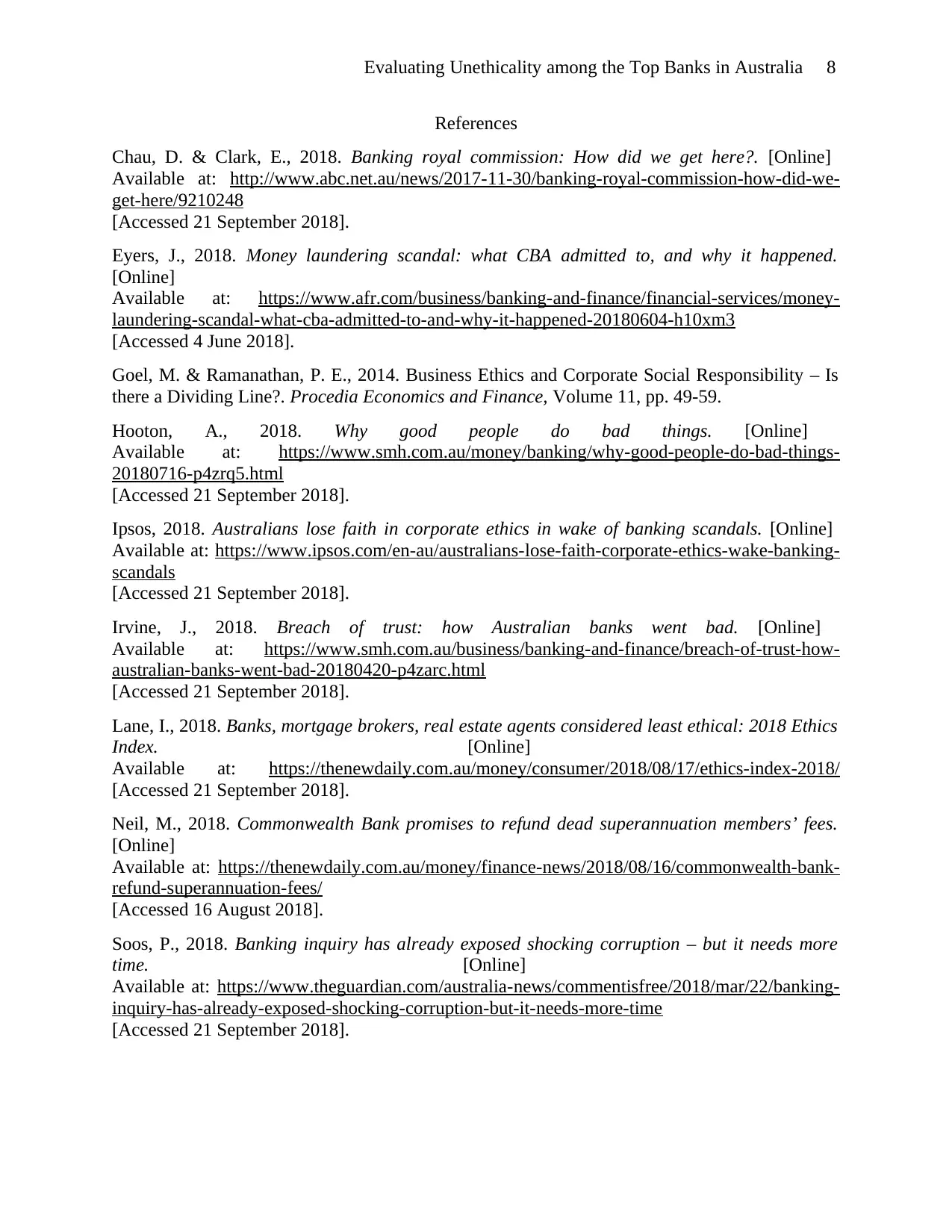
Evaluating Unethicality among the Top Banks in Australia 8
References
Chau, D. & Clark, E., 2018. Banking royal commission: How did we get here?. [Online]
Available at: http://www.abc.net.au/news/2017-11-30/banking-royal-commission-how-did-we-
get-here/9210248
[Accessed 21 September 2018].
Eyers, J., 2018. Money laundering scandal: what CBA admitted to, and why it happened.
[Online]
Available at: https://www.afr.com/business/banking-and-finance/financial-services/money-
laundering-scandal-what-cba-admitted-to-and-why-it-happened-20180604-h10xm3
[Accessed 4 June 2018].
Goel, M. & Ramanathan, P. E., 2014. Business Ethics and Corporate Social Responsibility – Is
there a Dividing Line?. Procedia Economics and Finance, Volume 11, pp. 49-59.
Hooton, A., 2018. Why good people do bad things. [Online]
Available at: https://www.smh.com.au/money/banking/why-good-people-do-bad-things-
20180716-p4zrq5.html
[Accessed 21 September 2018].
Ipsos, 2018. Australians lose faith in corporate ethics in wake of banking scandals. [Online]
Available at: https://www.ipsos.com/en-au/australians-lose-faith-corporate-ethics-wake-banking-
scandals
[Accessed 21 September 2018].
Irvine, J., 2018. Breach of trust: how Australian banks went bad. [Online]
Available at: https://www.smh.com.au/business/banking-and-finance/breach-of-trust-how-
australian-banks-went-bad-20180420-p4zarc.html
[Accessed 21 September 2018].
Lane, I., 2018. Banks, mortgage brokers, real estate agents considered least ethical: 2018 Ethics
Index. [Online]
Available at: https://thenewdaily.com.au/money/consumer/2018/08/17/ethics-index-2018/
[Accessed 21 September 2018].
Neil, M., 2018. Commonwealth Bank promises to refund dead superannuation members’ fees.
[Online]
Available at: https://thenewdaily.com.au/money/finance-news/2018/08/16/commonwealth-bank-
refund-superannuation-fees/
[Accessed 16 August 2018].
Soos, P., 2018. Banking inquiry has already exposed shocking corruption – but it needs more
time. [Online]
Available at: https://www.theguardian.com/australia-news/commentisfree/2018/mar/22/banking-
inquiry-has-already-exposed-shocking-corruption-but-it-needs-more-time
[Accessed 21 September 2018].
References
Chau, D. & Clark, E., 2018. Banking royal commission: How did we get here?. [Online]
Available at: http://www.abc.net.au/news/2017-11-30/banking-royal-commission-how-did-we-
get-here/9210248
[Accessed 21 September 2018].
Eyers, J., 2018. Money laundering scandal: what CBA admitted to, and why it happened.
[Online]
Available at: https://www.afr.com/business/banking-and-finance/financial-services/money-
laundering-scandal-what-cba-admitted-to-and-why-it-happened-20180604-h10xm3
[Accessed 4 June 2018].
Goel, M. & Ramanathan, P. E., 2014. Business Ethics and Corporate Social Responsibility – Is
there a Dividing Line?. Procedia Economics and Finance, Volume 11, pp. 49-59.
Hooton, A., 2018. Why good people do bad things. [Online]
Available at: https://www.smh.com.au/money/banking/why-good-people-do-bad-things-
20180716-p4zrq5.html
[Accessed 21 September 2018].
Ipsos, 2018. Australians lose faith in corporate ethics in wake of banking scandals. [Online]
Available at: https://www.ipsos.com/en-au/australians-lose-faith-corporate-ethics-wake-banking-
scandals
[Accessed 21 September 2018].
Irvine, J., 2018. Breach of trust: how Australian banks went bad. [Online]
Available at: https://www.smh.com.au/business/banking-and-finance/breach-of-trust-how-
australian-banks-went-bad-20180420-p4zarc.html
[Accessed 21 September 2018].
Lane, I., 2018. Banks, mortgage brokers, real estate agents considered least ethical: 2018 Ethics
Index. [Online]
Available at: https://thenewdaily.com.au/money/consumer/2018/08/17/ethics-index-2018/
[Accessed 21 September 2018].
Neil, M., 2018. Commonwealth Bank promises to refund dead superannuation members’ fees.
[Online]
Available at: https://thenewdaily.com.au/money/finance-news/2018/08/16/commonwealth-bank-
refund-superannuation-fees/
[Accessed 16 August 2018].
Soos, P., 2018. Banking inquiry has already exposed shocking corruption – but it needs more
time. [Online]
Available at: https://www.theguardian.com/australia-news/commentisfree/2018/mar/22/banking-
inquiry-has-already-exposed-shocking-corruption-but-it-needs-more-time
[Accessed 21 September 2018].
1 out of 8
Your All-in-One AI-Powered Toolkit for Academic Success.
+13062052269
info@desklib.com
Available 24*7 on WhatsApp / Email
![[object Object]](/_next/static/media/star-bottom.7253800d.svg)
Unlock your academic potential
Copyright © 2020–2025 A2Z Services. All Rights Reserved. Developed and managed by ZUCOL.